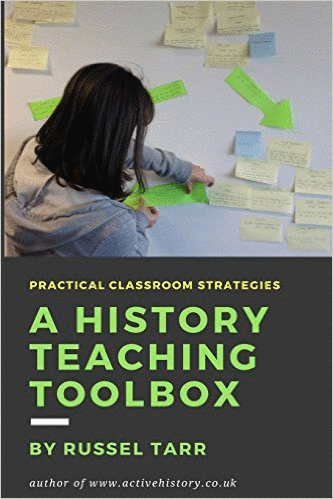Transform your history classroom
ActiveHistory provides educational, award-winning interactive simulations, decision-making games, self-marking quizzes, high-quality worksheets and detailed lesson plans for the school history classroom. All resources have been designed by full-time history teacher Russel Tarr.
An ActiveHistory subscription provides everything you need to construct and deliver a History course from start to finish for the entire 11-18 age range!
These consist not just of lesson plans, worksheets and teacher notes, but also multimedia lectures and interactive games and historical simulations ideal for remote learning and self-study.
World History teaching resources for the high school classroom: lesson plans, worksheets, quizzes and simulation games for KS3, IGCSE, IB and A-Level teachers.
 To what extent was the League of Nations a success? (1920s)
To what extent was the League of Nations a success? (1920s)
Note: Full and comprehensive teaching materials for this topic can be found on the ActiveHistory section for this topic: 1920s | 1929
From the syllabus
Focus Points
How successful was the League in the 1920s?
How far did weaknesses in the League's organisation make failure inevitable?
How far did the Depression make the work of the League more difficult?
Specified Content
The League of Nations: strengths and weaknesses in its structure and organisation, successes and failures in peacekeeping during the 1920s.
Past Questions
| 2016 Nov (region 3) | 2016 Nov (region 2) | 2016 Nov (region 1) | 2016 June (region 3) | 2016 P1 June (region 2) | 2016 P1 June (region 1) | 2015 Sample paper 1 | ||
| 1920s | a [4 marks] | What were the consequences of the Spanish Civil War for peace in Europe? |
What happened in relation to the Sudetenland during 1938 which raised tensions in Europe? |
Describe the crisis over Austria in 1934. | Describe the part played by the League in international humanitarian work. |
Describe the work of the Lytton Commission. |
||
| b [6 marks] | Why did Hitler take Germany out of the League of Nations in 1933? |
Why was Hitler’s invasion of Czechoslovakia in March 1939 significant? |
Why was Hitler able to re-militarise the Rhineland in 1936? | Why did the Japanese invasion of Manchuria weaken the League? |
Why did Japan invade Manchuria? |
|||
| c [10 marks] | ‘The policy of appeasement played a greater part in the outbreak of war in 1939 than did the Nazi-Soviet Pact.’ How far do you agree with this statement? Explain your answer. | How far was the outbreak of war in 1939 Hitler’s fault? | ‘Appeasement was a sensible response to Hitler’s aggression.’ How far do you agree with this statement? Explain your answer. |
‘Ineffective sanctions were the main reason for the failure of the League in Abyssinia.’ How far do you agree with this statement? | Which was the more important cause of the failure of the League: its organisation or its membership? |
Classroom activities
Cartoon Analysis
Analyse a series of cartoons by hovering over details and answering exam-style questions. When you have finished, the computer will provide you with a printout comparing your answer to a model answer. A great way to revise and develop sourcework skills.
Online decision Making Simulation 1 - The League in Theory
Take a series of decisions about the membership, structure and objectives of the League of Nations. At the end of the simulation, students will be presented with an essay writing frame based on their choices to complete as a homework exercise. Complete with 2 worksheets and a factual test as the game proceeds, the scores from which can be emailed to the teacher.
Decision Making Game 2 - The League in Practice
Take a series of decisions about the actions of the League in terms of Border Disputes, Disarmament and Social Affairs. At the end of the simulation, students will be presented with an essay writing frame based on their choices to complete as a homework exercise. Complete with 2 worksheets and a factual test as the game proceeds, the scores from which can be emailed to the teacher.
Can you survive the Wall Street Crash?
Play the stock market and see if you make your fortune!
Interactive Revision Quizzes and Resources
Fling the Teacher Quiz: 1920s | Fling the Teacher Quiz: Great Depression

Ideal for a starter activity. Outline the main task for the day at the beginning of the lesson. Then, give students 10 minutes to play the game. Anyone finishing within the 10 minutes should get points reflecting the amount of minutes left on the clock, then move directly on to the main task for the lesson whilst the rest of the class continue to play.
Repeat this format for ALL your revision lessons to create a "Revision Leaderboard" with a prize given to the overall high score at the end of revision time.
"Who Am I?" Challenge
Each team will be presented with a clue about a key historical figure. They get 50 points if they guess it correctly. If they wish to 'pass', they get further (easier) clues but the points available steadily decline. An incorrect guess at any point means they get zero points for that round. You can play as many rounds as you wish. It's a great way to revise!
Collapsible Revision Notes: League in the 1920s
Collapsible revision notes created using www.classtools.net.
IGCSE Revision: Homepage

© 1998-2025 Russel Tarr, ActiveHistory.co.uk Limited (Reg. 6111680)
1 Torrin Drive, Shrewsbury, Shropshire, SY3 6AW, England
Privacy Policy | Contact






